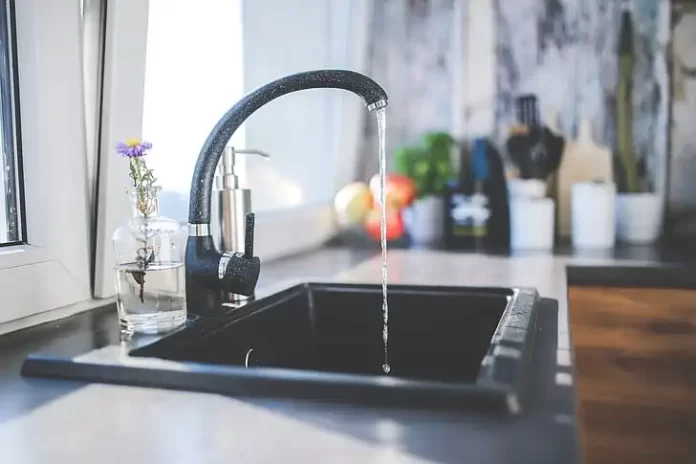Are you struggling with keeping your composite sink clean and spotless? Whether you’re dealing with daily grime or stubborn stains, this guide offers you the perfect solutions. Learn how to maintain the beauty and functionality of your composite sink with these easy, effective methods.
What is a Composite Sink?
A composite sink is a blend of natural stone and acrylic resins, offering durability and a sleek appearance. Popular in modern UK homes, these sinks come in various colours and are known for their resistance to scratches and impacts. Understanding your sink’s material is key to effective cleaning.
How to Clean a Composite Kitchen Sink
Regular Cleaning Routine:
- Daily maintenance is key. Wipe your sink with a soft cloth and mild dish soap after each use to prevent build-up.
- Avoid harsh chemicals. Stick to non-abrasive cleaners that won’t damage the composite material.
- Rinse thoroughly. Ensure all soap residue is washed away to avoid dulling the sink’s surface.

Deep Cleaning Techniques:
- Monthly deep cleaning is essential. Use a mixture of warm water and mild detergent or a specialized composite sink cleaner.
- For scrubbing, use a soft brush or a non-scratch pad. Gently scrub in a circular motion to remove stubborn grime.
- Rinse with clean water and dry with a soft cloth to prevent water spots and maintain shine.
Removing Tough Stains with Different Methods
Keeping your composite sink looking new can be a challenge, especially when it comes to tough stains. However, with the right methods, you can effectively remove even the most stubborn stains. Here’s how to tackle them using natural solutions, commercial cleaners, and specialized techniques.
Natural Solutions
Baking Soda Paste
This is a go-to solution for gentle yet effective cleaning. Mix baking soda with enough water to form a paste. Apply this paste directly to the stain and let it sit for 5-10 minutes. The baking soda acts as a mild abrasive, lifting the stain without scratching the sink’s surface. After letting it sit, gently scrub with a soft sponge or cloth in a circular motion and then rinse thoroughly with water. This method is particularly effective for removing marks from coffee, tea, or food spills.
Lemon Juice and Salt
For tougher stains, lemon juice’s natural acidity can help. Mix equal parts lemon juice and salt to form a paste. Apply it to the stain and let it sit for about 5 minutes. Then, scrub gently with a soft brush or cloth. The acidity of the lemon juice can help break down tougher stains, while the salt acts as a gentle abrasive. This method works well for stains that are more set-in, such as red wine or beetroot stains.
Commercial Cleaners
Specific Composite Sink Cleaners
There are cleaners specifically designed for composite sinks. These products are formulated to tackle tough stains without damaging the sink’s material. It’s essential to choose a cleaner suitable for your specific type of composite sink and follow the manufacturer’s instructions. Apply the cleaner as directed, usually by spraying or applying it to the stain, letting it sit for the specified time, and then scrubbing gently with a non-abrasive tool before rinsing. These cleaners can be particularly effective for oil-based stains or for removing build-ups of grime and soap scum.
Specialized Techniques
White Vinegar for Hard Water Stains
Hard water can leave behind mineral deposits that create unsightly stains. To combat this, use a solution of equal parts white vinegar and water. Apply the solution to the stains and let it sit for about 10 minutes. The acidity of the vinegar helps dissolve mineral deposits. After it has sat, gently scrub and rinse well. This method is safe for regular use and is particularly effective for maintaining the sink’s overall cleanliness and brightness.
Lemon Juice and Baking Soda for Food Residues
If your sink has stains from food residues like berries or turmeric, a mixture of lemon juice and baking soda can work wonders. The lemon juice helps to break down the food pigments, while the baking soda provides a mild abrasive cleaning action. Apply the mixture to the stain, let it sit for a few minutes, then scrub gently and rinse. This natural method gets the job done without causing any damage to your sink.
Colour Specific Cleaning Tips
Maintaining the original beauty and luster of composite sinks can depend greatly on their color. Here are detailed tips for cleaning composite sinks based on specific colours:
How to Clean Black Composite Sink
Daily Care: Use a soft cloth and a mild detergent for everyday cleaning. This maintains the sink’s dark elegance and prevents water spots.
Dealing with Scratches: Minor scratches can be more visible on black surfaces. Use a fine-grade sandpaper gently if necessary, followed by a polish specifically designed for black composite sinks.
Avoiding Bleach: Never use bleach on black composite sinks, as it can cause discoloration and dull the finish.
Restoring Shine: To restore shine, occasionally rub a little olive oil on the surface using a soft cloth.
How to Clean a White Composite Sink

Stain Prevention: Given their light colour, white sinks can show stains more easily. Wipe up spills immediately, especially from dark or highly pigmented substances.
Baking Soda Paste: For tougher stains, apply a paste of baking soda and water, let it sit for a few minutes, then gently scrub and rinse.
Regular Bleach Use: If allowed by the manufacturer’s instructions, you can sometimes use a watered-down bleach solution to keep the sink’s white color bright. Make sure to rinse the sink well after using the bleach.
How to Clean a Howdens Composite Sinks
Manufacturer’s Instructions: Always check Howdens’ specific care instructions for their composite sinks. They might have recommended products or methods.
Mild Cleaning Solutions: Typically, a mild detergent mixed with warm water is effective. Avoid using abrasive pads, as they can dull the surface.
Hard Water Stains: To remove hard water stains, use a mixture of equal parts water and white vinegar. After applying this solution, be sure to rinse the area completely.
How to Clean Grey Composite Sink
Gentle Cleaning: Use soft cleaning tools and mild detergents to avoid scratching the surface.
Frequent Rinsing: Grey sinks can show soap residue more readily. Rinse thoroughly after cleaning to maintain a spot-free appearance.
Avoid Harsh Chemicals: Steer clear of harsh chemicals that can strip the sink of its natural matte finish.
Conclusion
Maintaining a composite kitchen sink requires a blend of regular cleaning, careful handling, and the occasional deep clean. By using these simple yet effective practices into your routine, you can ensure your sink remains both functional and aesthetically pleasing. Keep in mind, to keep a composite sink looking good, it’s important to use the right cleaners, stay away from strong chemicals, and quickly take care of any stains or build-ups. With proper care, your composite sink can continue to be a stylish and durable feature in your kitchen for many years.
FAQs
Q: What’s the best way to clean a composite sink daily?
For daily cleaning, use a mild detergent or dish soap with warm water. Apply with a soft cloth or sponge, rinse the sink well, and then dry with a clean towel to prevent water spots.
Q: Can I use vinegar to clean my composite sink?
Yes, vinegar is safe for composite sinks. Mix equal parts of water and white vinegar to treat hard water stains or general cleaning. Remember to rinse thoroughly afterwards.
Q: Are abrasive cleaners safe for composite sinks?
No, avoid abrasive cleaners as they can scratch and damage the surface of composite sinks. Stick to non-abrasive, gentle cleaning products.
Q: How can I remove tough stains from my composite sink?
Create a paste with baking soda and water, apply it to the stain, let it sit for a few minutes, then gently scrub with a soft brush or sponge and rinse off.
Q: Can bleach be used on composite sinks?
Generally, it’s not recommended to use bleach on composite sinks as it can damage the material. If necessary, use a highly diluted bleach solution sparingly and rinse thoroughly after use. Check the manufacturer’s guidelines first.
Q: Is it safe to use hot water for cleaning a composite sink?
Yes, you can use hot water for cleaning, but avoid extreme heat, like placing a hot pan directly in the sink, as it can damage the sink’s material.
Q: How often should I deep clean my composite sink?
Aim to deep clean your composite sink once a month using a baking soda paste or a suitable sink cleaner to keep it in optimal condition.







